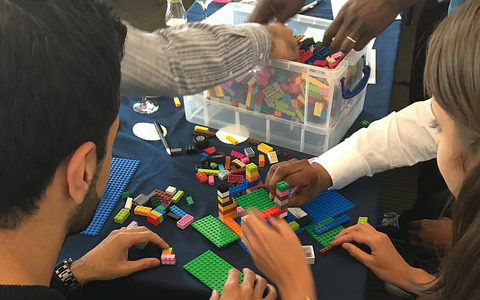Looking back to the start of the year, when my current team were green and in an unquestionable forming stage, it’s clear that the challenges we faced were a big part of what made us bond as a team.
We waited two months for our official kit to arrive, and during that wait it was interesting to note how quickly we adapted despite not having the tools we would normally expect to have to do our jobs. We used our own laptops of course, so we weren’t without technology, but we were only able to get those laptops working together by buying some cloud space to store shared work (which our lead dev paid for out of his own pocket).
I wondered – could it be the depravation that bonded us so well as a team – this shared experience, of having to compromise and support each other through those challenging times, where we were all ‘in the same boat’ having to think creatively to allow us to work how we would if we had the standard tools available.
This slightly artificial scenario, unique to our particular section of the government, has actually paid off in helping our team to work together more effectively. It gave us time to plan, to understand each other’s expectations and more interestingly, gave everyone an appetite to succeed, despite the odds.
This anticipation to be successful was not only in terms of delivering a digital solution. There was also a strong desire for the team to want to work well together, to follow best practice in agile and to give our clients both a team and technology they could be proud of.
I have wondered how we would have got on, had we had everything we needed from the outset. The team ranges from graduates to experienced seniors, with many skills levels in between. How would it have been if we had hit the ground running? Would our juniors have understood what was expected of them, or would they have been under immense pressure to perform at the same level as the seniors? Would the seniors have been more competitive – rushing to prove themselves without taking time to think carefully about our approach over the long term. And how easily would we have got up and running with the agile process, considering everyone had different prior knowledge of the agile methodology.
From a Scrum Master perspective, this hands-on period of Sprint Zero, Initiation, or whatever you want to call it, was more valuable than I ever imagined. Having got used to using a range of online productivity tools in my previous roles, I had to revert to a physical scrum board and post-it notes, which we still use today alongside our Jira board. It may never have been apparent that a physical board to gather round for stand-up gave us focus, had we been given Jira from the outset. Standing in front of a physical board and moving a few post-it notes each day still gives us some theatre and a chance to lighten the start of each day.
It also gave me ample opportunity to gauge what experience of scrum and agile each team member had. I identified where the weak points were and how I needed to adjust my style to boost those areas which were not fully understood or that required a whole team understanding. Had I got JIRA or Trello from the start, then our ceremonies would have been flat, and cross-team communication would have been much less dynamic.
Now the team is double it’s original size, I feel sad that all the staff who joined over the last 5 months didn’t get to take part in our shared experience of the technology drought. Having recently split into two smaller, more manageable teams, we’ve gone back a few steps in terms of being a cohesive unit, but I’m sure with time we will find other challenges to bond over – and have shared moan and camaraderie.
